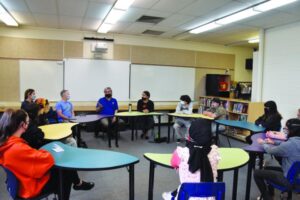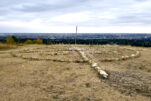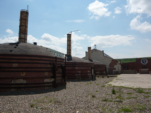Alexandra honours Kamloops 215 at round table
By LAUREN THOMSON Local Journalism Initiative Reporter on June 10, 2021.
 First Nations Métis Inuit co-ordinator Darrell Willier (centre), speaks during a round table discussion on the impact of the discovery of 215 Indigenous students in Kamloops.--NEWS PHOTO LAUREN THOMSON
First Nations Métis Inuit co-ordinator Darrell Willier (centre), speaks during a round table discussion on the impact of the discovery of 215 Indigenous students in Kamloops.--NEWS PHOTO LAUREN THOMSONlthomson@medicinehatnews.comStudents, teachers, co-ordinators and support workers at Alexandra Middle School joined together Wednesday morning, providing a place to ask and answer questions, and to discuss the discovery of and honour the Kamloops 215. The morning began outside the school with students and teachers from AMS participating in a traditional smudging ceremony with First Nations Métis Inuit support worker Shirley Boomer. “I’m just so proud of all the kids,” said Boomer, “and it just fills my heart with joy that they’re taking it seriously. Moving ahead with something, to not forget this, because this is just such a flash in the pan, but for this to actually keep going, we are so thrilled about that.” Student Mateo Laliberte says the smudging ceremony, “was really eye opening, it was really calming.” Following the ceremony, Paul Bennett, Grade 7 humanities teacher for AMS, led his class inside the school for a round circle discussion. The students gathered around the tables with Bennett, First Nations Métis Inuit co-ordinator Darrell Willier and support workers Shirley Boomer and Morgan Muir. “For decades we’ve known that there are missing children,” shared Willier. “But the problem is we didn’t know where they were.” Willier also indicated his mother spoke of the residential school she attended, and hopes they can look for missing children there, too. “The five bands that sent kids there were quite happy when this company found the bodies because now it’s going to be absolutely undeniable,” said Willier. “When you have 215 markers in a field where the school was, it’s going to make you pay attention.” The Grade 7 humanities students are certainly paying attention to Canadian history and its impact on them today, with many of their questions and comments during the round circle discussion being followed first by heavy silence. “It was really upsetting to hear how young some of these kids were,” said one student in the circle, “And that they could’ve grown up to do things like we’re getting the chance to do now, but they didn’t have that opportunity.” “It’s a reminder that Canadian history isn’t all good,” another student said. “And we didn’t all come together in peace and harmony, but things like this really bring up that it was such an unfair act in how people were treated back then.” Bennett has been actively engaged in discussion with his classes throughout his teaching years, saying he tries to use people and resources to bring true, authentic stories into his classroom for his students. “I think that they have taken the history,” said Bennett. “And they’ve absorbed it and really thought about it critically, so for the most part, the questions haven’t been about what happened, I think they’ve accepted a lot of that just as the truth, but I think most of it is regarding how do we move forward … I think that they’re more concerned with today and tomorrow than they are about questioning past, I think they want to move forward with resolving it. I have been very impressed by that.” Student Annie Noon says, “This is not just history anymore, it’s a present issue.” First Nations Métis Inuit support worker Morgan Muir spoke about her day with the students. “I think it gives us a lot of hope as Indigenous People moving forward that the young generation are wanting to hear the truth and wanting to learn more about what actually happened, and like we said take that action going forward. I really think this is a turning point for Canadian Society right now, what do we do now that the truth is irrefutable?” Principal Todd Samuelson challenged the group of students to have the courage to remind him to continue to engage in this conversation. “You’re going to remind us of this day, and what happened,” said Samuelson. “And say it’s more than one day a year or a special event.” 20
-19




